Probation Violation
If you’re facing a probation violation charge, it’s imperative that you contact an experienced Minnesota criminal defense attorney right away.
At Ringstrom DeKrey, we have represented hundreds of clients facing probation violations. We have the necessary experience, expertise, and commitment to help you fight this charge.
Table of contents
Stay of Adjudication
Probation Requirements
Common Terms & Conditions of Probation
Types of Probation Violations
Probation Hearings
Common Defenses to Probation Violation Charges
Stay of Adjudication
The judicial system may place criminal defendants on probation instead of sending them to jail. For example, someone can receive probation if convicted of a crime, if they accepted a plea bargain, or if they received a stay of adjudication.
The jail or prison sentence is “stayed” or suspended to give the defendant an opportunity to stay out of trouble. In general, they must complete probation, and prove to the court and community that they have changed.
Probation Requirements
Probation comes with several requirements that an individual must follow. These terms and conditions are unique to each individual. As a result, they are usually based on the facts of the case, the defendant’s criminal history, and the type of crime.
As long as the condition relates to the offense involved, a judge has the discretion to impose any condition they see fit. Here, a violation of probation means you have failed to meet or complete the requirements. If you’re found guilty of probation violation, the judge could require you to meet additional terms or order you to serve jail time.
Common Terms & Conditions of Probation
Some of the most common probation conditions are
An order to obey all laws of the court
Fines and/or restitution
A requirement that you abstain from alcohol and drugs
Attend an alcohol or drug program
A requirement that you do not operate a vehicle with a measurable amount of alcohol in your system
Installation of an ignition interlock device
Random testing for drugs and alcohol
A provision that you allow the police to conduct random searches on your person or property with or without a warrant
Being employed
No contact with certain people, especially the victims of a crime
Community service
An order to commit no similar offenses
Reporting to your probation officer
Remain in the state of Minnesota
Wear an electronic monitor
Not to use, own, or possess a firearm
Unfortunately, it is not uncommon for individual on probation in Minnesota to violate the terms of their probation. Some of the most common probation violations are
Failure to appear for a court date
Committing a new crime
Failure to pay restitution or a fine when you have the ability
Failure to report to your probation officer
Failing an alcohol or drug test
Traveling out of state without informing your probation officer
If you are suspected of any probation violation, your probation officer or a police officer may arrest you and take you to court. Alternatively, a judge can issue a Minnesota arrest warrant if you failed to appear for court or report to your probation officer.
Types of Probation Violations
Authorities classify probation violations into two categories: technical violations and direct violations.
The type of violation involved helps determine the nature of the offense. In Minnesota, drug violations are intentional violations. This includes activities such as not attending drug counseling or failing a drug or alcohol test.
Conversely, technical violations are offenses that are usually unintentional. With these types of violations, it’s easier to prove that the error was not the defendant’s fault. For example, someone might commit a technical violation if they believed their probation term was complete.
Failure to adhere to all probation conditions will result in the filling of a probation violation. Furthermore, if you deny the allegations, the case will proceed to a contested hearing, known as a Morrissey hearing.
Probation Violation Example
Here’s an example. Frank is on probation following an assault conviction. One of the probation conditions is that Frank has no contact with his neighbor Jane, who was the assault victim. Jane calls the police to report that Frank came to greet her as she was watering her plants.
Police file a probation violation report against Frank and call him in for a probation hearing. One piece of evidence presented by the state against Frank is a letter from Jane saying that he talked to her. However, Jane is not called in as a witness. In a normal criminal trial, the letter would be hearsay. But the judge at Francis’ probation hearing may choose to have the letter used as evidence.
Probation Hearings
Morrissey Hearing
In this hearing, the judge examines the evidence presented by both sides and decides whether you violated the terms of your probation. If you admit to a violation or the court finds you guilty, they may revoke your probation. Or the judge may also allow your probation to continue with or without extra consequences.
admit/deny hearing
There are two stages to Minnesota probation revocation hearings. The first appearance is referred to as an “Admit/Deny” hearing.
The person on probation has the option of admitting or denying the alleged probation violation. Defendants in an admit/deny hearing enjoy the same rights as defendants in criminal trials.
Before the hearings proceed, authorities must advise you of your right to
An attorney
Disclosure of all evidence against you
A hearing on the merits of the violation
Testify on your own behalf
Present mitigating evidence or extenuating circumstances that may have led to your violation
Importantly, you do not have to go to an admit/deny hearing alone. An attorney can represent you and make your side of the story known.
It’s worth noting that probation hearings are just as important as other court proceedings. If you’re found in violation of your probation, the potential consequences can range from being placed back on probation to serving jail time. As such, it’s important to understand your rights and have an attorney who can protect you from harsher consequences for a violation.
Probation Revocation Hearings
As is the case with the Admit/Deny hearing, authorities will inform you of your rights discussed above.
One of the major differences between a criminal trial and a probation violation hearing is that a judge presides over the hearing. There is no jury involved.
Also, the state’s standard of proof is less in a probation hearing. In a criminal trial, the prosecutor must meet the high standard of “beyond a reasonable doubt.” In a probation hearing, the state only needs to show by a “clear and convincing” standard that you committed the violation.
Rules of Evidence in a Probation Revocation Hearing
Rules of evidence also do not apply in a probation revocation hearing. This means that prosecutors can introduce some types of evidence that a judge would not allow in a trial.
This type of evidence is known as hearsay evidence. In essence, hearsay evidence is any statement offered in evidence to prove the truth, but is not made by a witness testifying. Courts ban this as it deprives the defendant of the right to cross-examine the individual who made the statement.
Elements of Proof
The State must show that the individual on probation committed the violation. The prosecutor must prove the following:
The individual violated a specific term or condition.
It was inexcusable or intentional.
The need for confinement is greater than the policies favoring probation.
When making a decision based on the third element, the court will review the facts of the underlying offense, as well as the conduct.
Here, the judge will give you a chance to present mitigating evidence, such as
Contact with your probation officer.
Compliance with the other terms of your probation.
Accepting responsibility (which may show the judge that the violation is not evidence of a larger problem).
Preparing for a Probation Revocation Hearing
The best way to prepare for a probation violation hearing is by remaining compliant with the conditions of your probation.
Continuing to meet the requirements of your probation and bringing proof that you did will be a huge benefit to you. If you’re in custody, your attorney will gather information to show that you were in compliance with the probationary conditions.
Possible Penalties of a Probation Violation
At the end of your probation revocation hearing, the judge determines if you violated specific terms of your probation. If the judge finds you to be in violation, they will consider the seriousness of the violation, your criminal history, and other factors recommended by the probation department.
The judge can choose to
Reinstate probation without changing the conditions.
Modify probation with new, stricter conditions.
Revoke probation, meaning that you’re going to serve your jail or prison sentence.
You can request that the time you spent in a residential treatment facility, jail, or prison be credited toward your sentence.
For instance, if convicted of a felony punishable by a 2-year sentence, you could end up serving only eight months in prison for that sentence.
If a judge revokes your probation, you could face extra fines, community service, and house arrest.
There’s a wide range of possible penalties for probation violations, including a longer probationary period. For instance, if you’re placed on probation for 3 years, but the maximum is 5 years, a judge could extend your probation for the full 5 years.
Common Defenses to Probation Violation Charges
Here is a list of six common defenses that may fit your situation:
You can’t pay your fines – A judge may revise your charges if you can show that you lost control of your financial situation.
The filling dates are incorrect – If your attorney discovers an error in the probation term, the judge may shorten or drop your probation.
You have valid reasons for not reporting to your PO – You may have been unable to fulfill your probation due to hospitalization or incarceration.
You did not submit important documents for valid reasons
False drugs or alcohol test results – Tests may come back positive due to incorrect administration.
You did not contact the alleged victim – If the alleged victim of a crime approached you.
Schedule a free consultation
Email: assistant@ringstromlaw.com
Tel: 218-284-0484
814 Center Ave. Ste. 5
Moorhead, MN 56560

